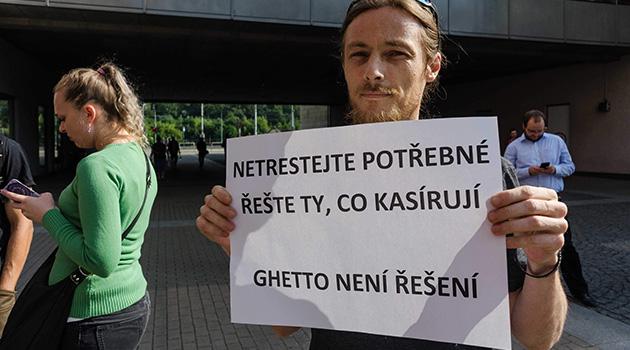Czech local zones to cancel housing benefits create more poverty, the biggest one is Ústí nad Labem

The city of Ústí nad Labem and the municipality of Trmice have made it onto the map of the 20 most important events in social policy in the Czech Republic for 2019. That report is published annually by the nonprofit Institute for Social Inclusion, and the context is not very favorable: This is about introducing zones where housing benefits are not disbursed, and the territories of both Trmice and Ústí have had this in place across the board since March 2019.
The Institute’s report recalls that in other Czech cities, these measures have been abolished by Regional Authority interventions, but the Ústecký Region has not yet decided to do that. While at the close of 2018, 71 municipalities country-wide were considering banning housing benefits on their territories and 22 actually did so, one year later 100 municipalities were considering the ban and in 66 of them, by the close of 2019, at least one area with a reportedly “increased incidence of socially undesirable phenomena” had been declared – in common parlance, a “ghetto”.
The number of municipalities with housing benefit-free zones has therefore tripled, year-on-year. Of course, these are municipalities that have a zone that is just a single street or part of a quarter.
Only a few municipalities have declared their entire territories “ghettos”. The city of Ústí nad Labem, with its almost 100 000 inhabitants, is the biggest such zone in the country.
Waiting for the courts
Since December 2017, a motion to overturn the provision in the law on aid to those in material distress that allows housing benefit-free zones to be declared has been before the Czech Constitutional Court. That complaint was filed by a group of 20 senators and as of this writing has been waiting two and a half years to be assessed.
“The ban on housing benefits is not delivering a victory over the traffickers in poverty, but is just delivering ‘fewer benefits, more poverty’, i.e., further deterioration of the situations of the households affected, including families with children. Housing benefit-free zones are a consequence of the quandary the state finds itself in and its submission to pressure from several municipalities to leave the role of arbiter to them when it comes to deciding to whom to provide aid and whom not,” states the Institute in its analysis.
The map of events in social policy reports on the 20 most important events during the preceding year. This year, in addition to housing benefit-free zones, the attempts of city hall in Most to resolve the situation at the Chanov housing estate by installing “container” housing were also noted.
In Ústí nad Labem and Trmice, housing benefit-free zones have applied to the entire territory since March of 2019 and the city has been taken to court by opposition local assembly member Karolina Žákovská over the issue. The Ústecký Regional Court has postponed that proceeding pending the Czech Constitutional Court’s decision on the issue.
Elsewhere in the country, the findings of reviews of the policy undertaken by Regional Authorities are already known. The example of Kladno is famous, where the Central Bohemian Regional Authority abolished that town’s declaration of its entire territory as a housing benefit-free zone in 2018.
In June 2019, a decision was handed down by the Hradec Králové Regional Authority to abolish zones of this kind that had been declared by the town of Úpice, an example then followed by the Olomouc Region, which abolished an unlawfully-declared housing benefit-free zone in Šternberk on 12 November. The Institute’s analysis says the Ústecký Region is now the next “in line” to review the policy and should deal with official comments submitted against the declaration of the housing benefit-free zone across the entire territory of both Ústí nad Labem and the adjacent municipality of Trmice.
The report directly cites the workding of the above-mentioned repealing resolutions of other regions as inspiration for the bureaucrats at the Ústecký Regional Authority, as follows: “The current legislation, therefore, does not facilitate a municipal authority issuing a [housing benefit-free zone] to declare the entire territory of a municipality an area with an increased incidence of socially undesirable phenomena… It is not possible to perceive indebted inhabitants, or the number of collections proceedings underway, or a higher degree of unemployment reported for a cadastral territory of the municipality as socially undesirable phenomena in the sense of Section 33d paragraph 1 letter b) of the law on aid to those in material distress…”
Elsewhere, the report quotes the decision on the town of Úpice, which states: “The indebtedness that usually represents the main reason for housing loss by low-income persons and is a cause of their migration can be labeled an auxiliary phenomenon of their social exclusion. Among other things, the declaration of a [housing benefit-free zone] across the board on the basis of such reasons reduces the effectiveness of targeted, conceptual approaches and programs that aim to ameliorate problems for persons finding themselves in unfavorable social situations or persons living directly in conditions of social exclusion.”
From the decision to abolish the housing benefit-free zones instituted by the local authority in Šternberk, the following is cited: “Neither from the justification for the [housing benefit-free zones], nor from the communications of the Department of Internal Affairs of the Municipal Authority of Šternberk is it apparent how the administrative body arrived at the conclusion that there is an increased degree of incidence of misdemeanors in the localities at issue, as the adopted measure does not include any comparision of the incidence of misdemeanors in different localities, nor does it include any other method for ascertaining the facts alleged.”
Let’s recall that the City of Ústí nad Labem justified its declaration of these zones, among other matters, by using fake arguments about a growth in crime. In reality, the crime rate in the city has been declining for several years now.
According to the Institute for Social Inclusion, of course, it is possible to anticipate problems with this policy option in the future as well. The Institute recalls that last year, the Czech Labor and Social Affairs Ministry prepared a bill through which it would directly abolish both current kinds of housing benefits and replace them with a new adjunct housing benefit.
“An essential feature of the bill on housing benefits is its transferring of responsibility for supporting housing benefits from being in the hands of the state to being in the hands of municipalities. Local authorities will be able, through mere passivity, to contribute to the housing benefit no longer being disbursed to those who live in the residential hotels throughout their territories. Through their own decisions, they then will be able to force a reduction, for a certain territory, in the highest rents eligible for the purpose of drawing these benefits for the period of one year – the similarity with housing benefit-free zones here is more than apparent,” warned the Institute in its report, which was presented in the Czech Senate last week.
First published in Czech for the Institute of Independent Journalism (Ústav nezávislé žurnalistiky).
